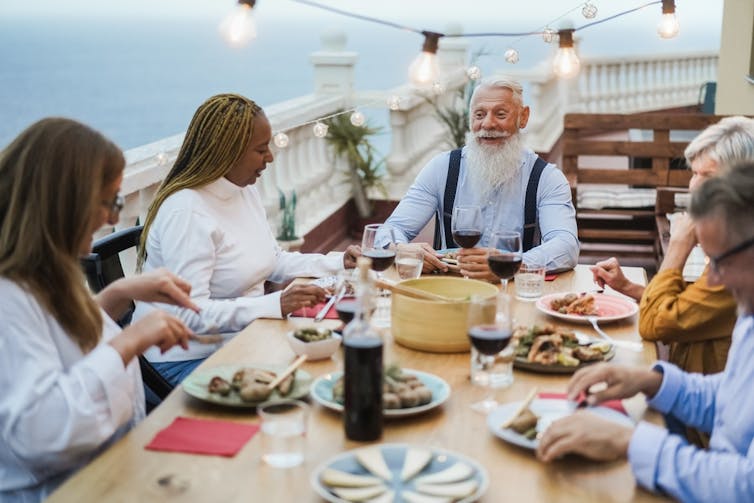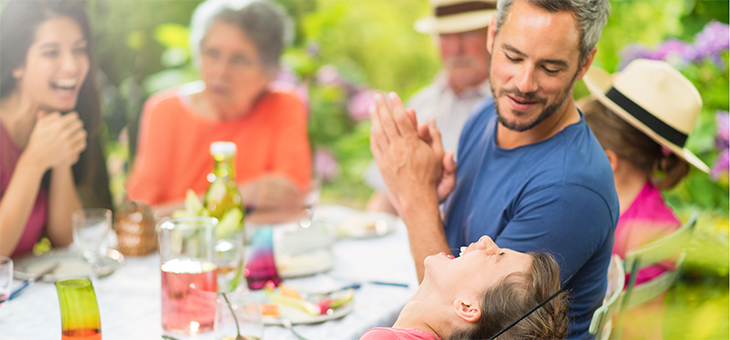Thea van de Mortel, Griffith University
Not many more sleeps until Christmas, and all those long lunches and get-togethers with family and friends.
If you’re hosting a gathering and want to avoid a super-spreader event, it’s worth having a discussion with your guests to set some rules to minimise the risk of COVID transmission.
For example, should you only ask vaccinated family members and friends to attend? Or require a negative rapid antigen test before arrival?
As an expert in infection control and prevention, I can offer some information to help you to decide.
How COVID spreads
Three ways SARS-CoV-2 (the virus that causes COVID-19) can spread are:
-
through respiratory droplets exhaled through breathing, talking, laughing, coughing and sneezing. These droplets tend to fall to the ground relatively quickly, due to their larger size, which can limit the distance they spread. Physical distancing of 1.5–2 metres reduces the risk of spread this way, as does wearing masks
-
through smaller respiratory aerosols that can hang in the air for longer periods and potentially travel longer distances. Masks and good ventilation are key strategies to avoid infection here
-
touching virus-contaminated surfaces and then touching your food or face. This isn’t as much of a risk as we first thought early in the pandemic but it’s still possible.
Eight tips to reduce transmission risk
1. Hand hygiene
The easiest way to avoid transferring any virus from your hands to your food or face is to ensure you wash or sanitise your hands regularly, particularly before touching food.
Ensure you provide ample hand sanitiser and hand soap for guests.
Avoid touching your eyes, mouth and nose (the latter is harder than you might think given on average we touch our faces about 23 times per hour).
2. Respiratory etiquette
People can have respiratory symptoms for various non-COVID reasons, for example asthma and hay fever.
Let your guests know before arriving that you want them to practice respiratory etiquette.
This means coughing or sneezing into their elbow rather than their hand, or into a tissue, followed by sanitising hands afterwards.
3. Don’t show up if you have symptoms
Make clear you expect guests shouldn’t attend if experiencing signs and symptoms of COVID.
These include sore throat, cough, fever, and loss of sense of taste and smell.
Keep a record of who came to the event, in case contact tracing is required.
4. Gather outdoors
Weather and circumstances permitting, have your event outdoors. This greatly reduces the risk of transmission, as the breeze can disperse infectious particles.
Evidence suggests transmission is almost 19 times more likely indoors than outdoors.
Ultraviolet B in amounts found naturally in sunlight also rapidly inactivates the virus on surfaces, as it damages the viral genetic material making it harder for the virus to replicate.

Shutterstock
5. Ventilation
If you must hold your event indoors, ensure the best possible ventilation by opening doors and windows.
Also consider portable air filters with HEPA filtration, which can remove infectious particles from the air. Some studies do show a benefit from HEPA filtration.
However, the effectiveness of machines on sale for home use varies. So do your research on the most effective devices.
6. Consider high-risk people
You might want to consider separating people at high risk from infection from others in space or time.
For example, relatives and friends that are at high risk (the elderly and anyone on chemotherapy or treatments that suppress the immune system) might sit at a greater distance from everyone else who may be getting out and about more and might have an infection that isn’t yet symptomatic.
You might also choose to separate visitors by time. For example, you may have your elderly grandparents visit for lunch, and then have other friends and family for dinner.
7. Ask guests to be fully vaccinated
If your guests are fully vaccinated, it will be safer for everyone.
First, someone who is fully vaccinated is less likely to contract COVID because the vaccine can help their body produce neutralising antibodies. These are proteins that bind to the spike protein of the virus, stopping it from binding to the receptor on cells that allows the virus to enter the cell.
Even if you’re vaccinated and do get infected, data from New South Wales shows you’re much less likely to be hospitalised or die from it.
Second, the vaccine triggers other responses from our immune system that help to reduce the overall viral load. So even if a vaccinated person gets infected, they’re likely to have lower amounts of virus in their nose, mouth and throat over the course of their illness and shed less virus for a shorter period of time.
That makes it less likely they’ll infect someone else.
8. Use rapid antigen tests
You might also want to consider rapid antigen self-testing to reduce the risk for everyone.
You could ask all guests to take one, and receive a negative result, before coming to your event. These don’t guarantee there will be no infections, but do provide an added layer of protection.
Have a happy (and infection-free) festive season!![]()
Thea van de Mortel, Professor, Nursing and Deputy Head (Learning & Teaching), School of Nursing and Midwifery, Griffith University
This article is republished from The Conversation under a Creative Commons licence. Read the original article.
What are you doing for Christmas this year? Have you put some thought into how you will make your events COVID-safe? Why not share your thoughts in the comments section below?
If you enjoy our content, don’t keep it to yourself. Share our free eNews with your friends and encourage them to sign up.

